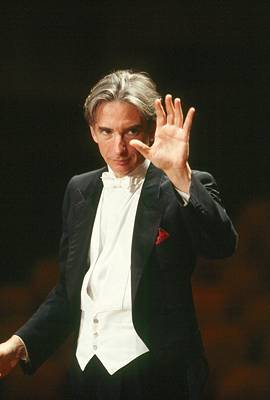 Conductor Michael Tilson Thomas Online scores: Tchaikovsky, Violin Concerto Ravel, Valses nobles et sentimentales Liszt, Tasso: Lamento e Trionfo |
Tchaikovsky, Violin Concerto, C. Tetzlaff, RNO, K. Nagano |
Anne Midgette, San Francisco Symphony at the Kennedy Center (Washington Post, March 26) ---, Anne Midgette interviews conductor Michael Tilson Thomas (Washington Post, March 21) Philip Kennicott, Tilson Thomas at the Kennedy Center (Philip Kennicott, March 24) Harry Rolnick, Eclectic And Electric (ConcertoNet, March 26) David Patrick Stearns, Thomas shows mastery of Mahler (Philadelphia Inquirer, March 25) Joshua Kosman, San Francisco Symphony's Mahler (San Francisco Chronicle, March 13) ---, Symphony premieres musical essay (San Francisco Chronicle, March 6) Richard Scheinin, San Francisco Symphony gives a stunning performance of Mahler's 'Resurrection' Symphony (San Jose Mercury News, March 12) ---, San Francisco Symphony debuts shimmering new work by Victor Kissine (San Jose Mercury News, March 6) Allan Ulrich, San Francisco Symphony (Financial Times, March 10) Cedric Westphal, SFist Interviews: Composer Victor Kissine (SFist, March 4) |
Victor Kissine, a Russian-born composer now residing in Belgium, describes his new work Post-Scriptum as "a variation on the theme of Ives's The Unanswered Question." The theme may come from Ives, but the piece evokes more the pointillism and Klangfarbenmelodie of Webern in many ways, a compendium of dissonant clusters and instrumental effects similar to what film composers borrowed from Bartók to depict scary scenes. The work opened in a serene mist of percussion, mute cymbal roll and shimmering tones from bowed xylophone, building up through washes of orchestral color, swelling and receding in Doppler-like effects. Kissine calls for a huge orchestra, with quite a workout given to the five percussionists, but also the harpists and pianist/celesta player: this huge canvas is then marked with a few bright, expressionist splashes of vivid color. In a way, later after the Ravel work, it seemed like a deconstruction of a piece like Ravel's waltzes, an etude in orchestral color, broken into its parts and reassembled in a Cubist collage. After such an innovative and unexpected program, it would have been crass to offer a traditional encore, but Tilson Thomas did no such thing, ending with the prelude to Delibes's ballet Sylvia, music for a chaste huntress that was dedicated by the conductor to "the brave women of the world." He did not have to mention that the story of that ballet comes from Aminta, a poem by none other than Torquato Tasso.
The final visiting orchestra to be brought to Washington by WPAS this season will be the Los Angeles Philharmonic (May 17, 8 pm), with their music director, Gustavo Dudamel.
[EDITED TO ADD: Actually, there are two more orchestras on the WPAS schedule: the Philadelphia Orchestra will also play in the Music Center at Strathmore (May 26, 7:30 pm).]
No comments:
Post a Comment